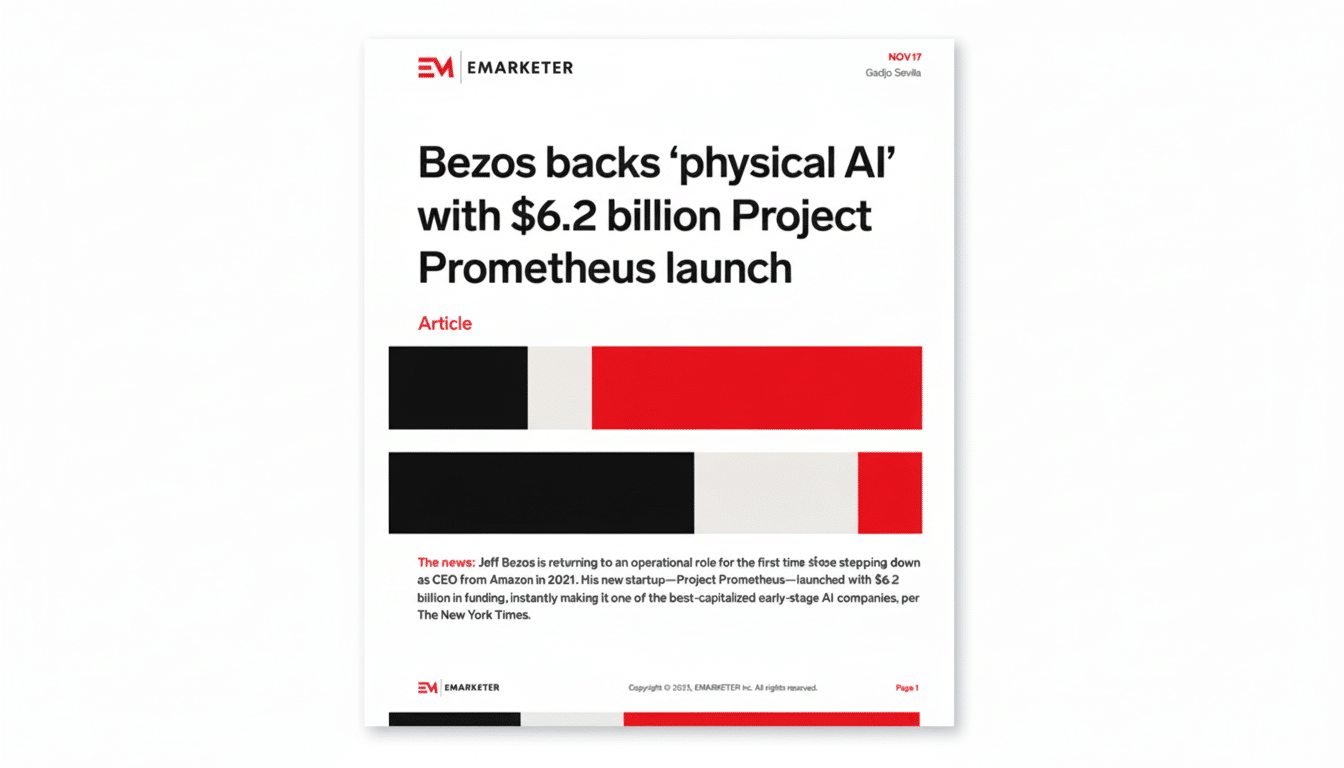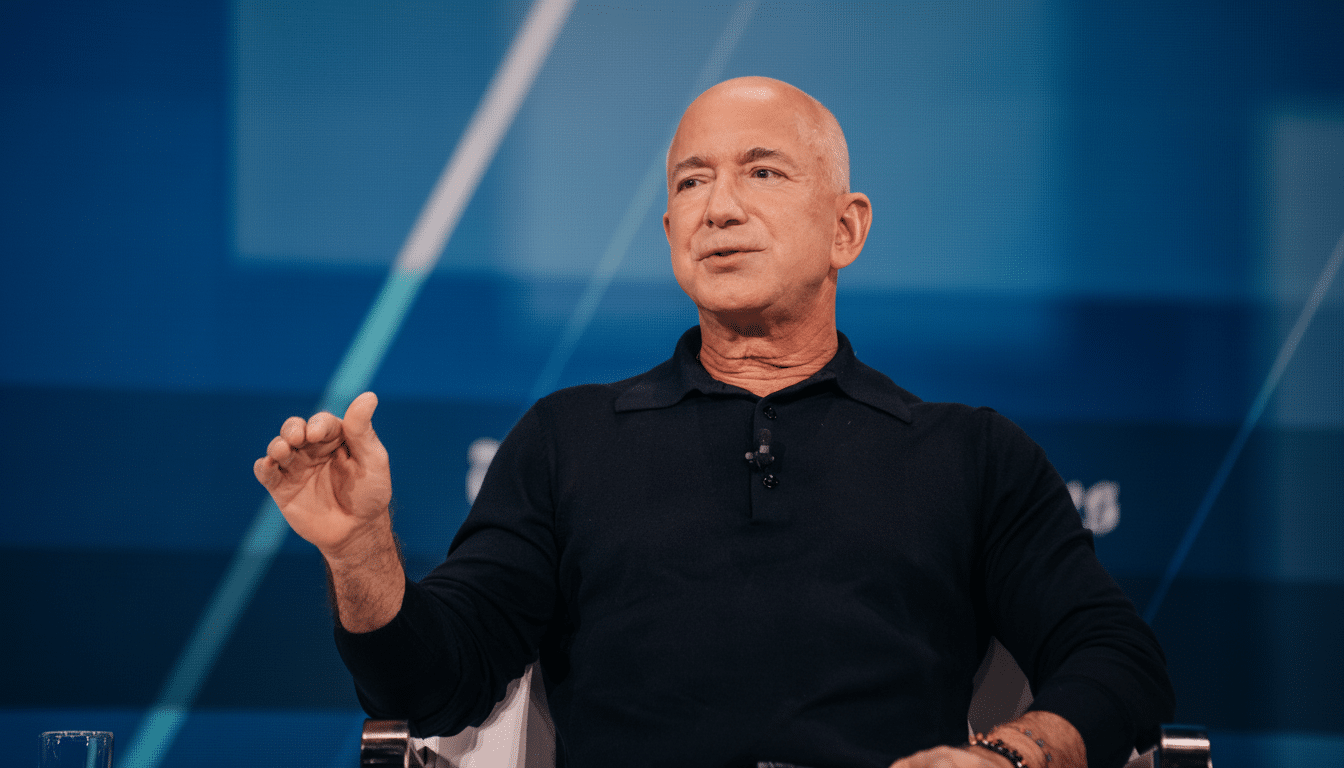In an attempt to break new ground and make his latest project the most successful to date, Jeff Bezos has decided to launch a physical artificial intelligence company that is called Project Prometheus.
Jeff Bezos debuts new artificial intelligence venture, Project Prometheus. And it’s not about adding yet another chatbot to the mix.

Bezos becomes co-CEO with Vik Bajaj, a former Google X and Verily executive. The company’s mission is to create “physical AI” for engineering and manufacturing — building systems that design, test, and ultimately assist in producing computers, vehicles, and spacecraft.
Details have been closely held, but Prometheus has reportedly brought on nearly 100 employees, including OpenAI and DeepMind researchers and workers from Meta. Bajaj’s professional profile also lists San Francisco, London, and Zurich as locations — which translates to global ambition and proximity to deep technical talent pools in AI, robotics, and advanced simulation.
Not another chatbot: focus on physical AI for industry and robotics
Unlike the startups rushing to ship chatbots or text-to-video tools, Project Prometheus is focused on the tough issue of the physical world: representing complex hardware, making factories more efficient, and coordinating fleets of machines. Think AI copilots for mechanical engineers, robotic manipulators sharpened by self-learning algorithms, and design tools that give new life to thousands of long-abandoned inventions piled up in shoeboxes 40 years ago, but that might yet hold the key to a faster-charging drone battery or a more efficient boiler.
Nvidia’s Jensen Huang has made the “physical AI” argument well known, that the future of AI will bring together large models, digital twins, and robotics to transform factories into autonomous systems that constantly get better at what they are doing. That vision fits with the company’s stated mission and reflects bigger shifts in industry to move AI off screens and into production lines, test stands, and vehicles.
The team and footprint behind Project Prometheus and expansion
Vik Bajaj provides deep expertise at the juncture of advanced R&D and commercialization from Google X and Verily, a valuable counterweight to Bezos’ operating instincts and long-term capital. The company’s hiring from elite AI labs suggests Prometheus is building a stack ranging from foundation models all the way up to control systems and simulation — skills that typically demand rare talent and sources of significant compute.
It’s Bezos’ first hands-on operating role since he stepped aside as Amazon’s chief executive last summer. He is still the owner of The Washington Post and founder of Blue Origin, which is run by CEO Dave Limp. Though not directly cross-pollinating, Prometheus’ focus does indeed obliquely indicate a potential crossover with Blue Origin’s vehicles, test infrastructure, and manufacturing programs the same way Elon Musk has entwined xAI’s models into other businesses like Tesla.

Why physical AI is emerging now across factories and aerospace
Industry is at an inflection point where AI trained on synthetic data, generated by high-fidelity simulators, can be leveraged to enhance capacity and accelerate real-world performance without the need for slow or risky physical trials. Factories’ and rockets’ digital twins can work through millions of what-if scenarios overnight, then return policies to robots, cobots, and quality-control systems the next morning.
As the International Federation of Robotics has reported, record numbers of robots have been installed in the past few years, and automotive and electronics make up more than half of deployments. That installed base is ripe for AI upgrades that enhance uptime, cut scrap, and speed changeovers. Consulting and industry analysis similarly suggest that this is just the beginning of multi-trillion dollars in value creation once AI shifts from desk jobs to core operations, where small efficiency improvements can amplify across enormous supply chains.
Bezos himself has been hovering over this space, with an investment in a robotics startup called Physical Intelligence along with other well-known AI investors. Prometheus may seem to be one of his bets not just to back but to build: ramp up recruiting, pull together an executive bench, and stake out the hard, high-payoff frontier where software decisions collide with physical risk.
What success would look like for Project Prometheus in industry
Early products might include AI copilots for hardware design, model-based controllers that help general-purpose robots perform delicate work, and factory optimization systems that direct humans, autonomous vehicles, and production cells. In transportation, models could design routes or optimize battery thermal loads and tune drive systems’ efficiency. In aerospace, that might mean being able to shrink test cycles, detect anomalies before they become failures, and simplify complex assembly.
For it to get there, Prometheus will require massive compute, privileged data from manufacturers, and tight integration with partners in autos, electronics, and space. Look for tea leaves in the form of strategic cloud deals, multi-year GPU commitments, and anchor customers in regulated industries — as well as hires with deep experience in safety certification and industrial standards. Also keep an eye out for whether any Prometheus technology appears in Blue Origin programs, even if unofficially, since there’s such obvious synergy.
The competitive noise will be deafening — Musk has already taken a shot on X — but the opportunity is to make AI indispensable in places with tight tolerances, expensive downtime, and zero tolerance for unreliable equipment. For if Prometheus can transform advanced models into reliable machines on factory floors and launch pads, it will have created something more durable than another chatbot: an AI business with real-world leverage.

